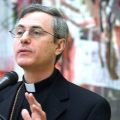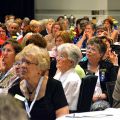News/Canada
Over-consumption of oil products, not the pipeline, is the real issue
By Evan Boudreau, The Catholic RegisterIt isn’t the construction of the Northern Gateway pipeline that raises great concern for Bishop Gary Gordon. Rather it is the perception that the pipeline is necessary in the first place.
Gordon, bishop of the Whitehorse diocese, said the proposed pipeline symbolizes society’s relentless hunger for oil, and that worries him.
“We’ve got a great problem with the sin of coveting and we export it all over the world,” said Gordon. “That’s kind of a root issue, we’re being driven by an insatiable need to have more but it’s not solving our deepest yearning and hungers.”
Enbridge has been working on its pipeline proposal since the early 2000s but didn’t formally make a public announcement until 2006. The project currently aims to build a 1,177 km sub-surface pipeline from Bruderheim, Alta., to Kitimat, B.C., and its port on the Pacific Ocean.
Since plans were announced, numerous parties have voiced environmental concerns, citing deforestation, wildlife habitat destruction and potential Pacific coast spills due to the treacherous waters near the port.
The religious voice has not been silent either. Recently the United Church of Canada, the country’s largest Protestant denomination at about three million strong, publicly opposed the pipeline expressing similar fears. And the Anglican bishops of British Columbia and the Yukon issued a statement questioning the integrity of the pipeline’s environmental impacts, while Presbyterians representing 28 parishes in British Columbia’s Lower Mainland also made their voice heard. They wrote to Prime Minister Stephen Harper criticizing the government for weakening environmental reviews, citing the same concerns as their United and Anglican brethren.
The Canadian Conference of Catholic Bishops is still considering if it will release a public statement regarding the issue. The matter came up for discussion Aug. 22 when the CCCB executive met outside Calgary, but there has been no public comment to date.
But there’s still a missing piece of the puzzle, said Gordon, and that makes things more problematic.
“I don’t know if we (should be) taking a position of opposing it. We (should be) taking a position of let’s give this a longer second look and a longer view on the real outcomes for Canadians,” he said, hoping the CCCB takes this stance. “We need to check our consumption and figure out a more simple way of living.”
Gordon’s not saying that we need to abandon every byproduct of the oil industry — he isn’t willing to give up his V8 4X4 Toyota Tundra and doesn’t expect anyone else in North America to ditch their ride. Rather, he’s suggesting that we re-evaluate how we use, and at what rate we consume, oil-based goods such as gasoline.
It’s an idea wholeheartedly supported by Dennis Patrick O’Hara, director of the Elliot Allen Institute for Theology and Ecology, as well as an assistant professor of theology, at Toronto’s University of St. Michael’s College.
“We wouldn’t be needing some of these (pipelines) if people weren’t consuming so much and if people weren’t so wasteful with resources,” said O’Hara, adding that oil companies are not to blame.
“We’re building this (pipeline) because we have a voracious appetite for this oil. That’s a part of the conversation that I’m not seeing or hearing.”
According to Statistics Canada, the annual gross sale of gasoline rose by 1.5 per cent in 2011 to 42.1 billion litres, marking the third consecutive increase despite prices rising at the pumps for Canadians.
This statistic highlights O’Hara’s, and Gordon’s, point that what is good for the economy is not always good for the environment — a point both men said is hard for Canadians to fully grasp.
“We have a petroleum-based economy and that’s not going to be changed overnight,” said O’Hara.
While profits are measured quarterly, the payoffs of environmentally friendly living aren’t truly seen for many years.
“We’ve got a cultural mindset that is set against, it is contrary, to the very thinking that we need for the kind of issues that we have now,” said O’Hara. “With climate change you improve your behaviour and you’ll see the benefits about 35 years later. It’s not that if you behave well today things are going to be better tomorrow.
“Things are actually going to get worse before we see the benefits and things getting better.”
A necessary commitment to consumption reduction Gordon said will only be successful if parishioners, who are the consumers, have their parish’s support.
“We’re shepherds of souls,” said the bishop. “The sacrifices of a simpler life are quite daunting for most of us.”
Windsor board disputes findings that led to provincial supervision
By Evan Boudreau, The Catholic RegisterThe Ontario Ministry of Education's decision to place the Windsor-Essex Catholic District School Board under provincial supervision is not sitting well with the board's trustees.
Deloitte and Touche LLP, an independent auditing, consulting and tax firm, produced a report for the Ministry of Education that detailed the various deficit-reduction shortcomings for the board's most recent budgets. It suggested the board appeared willing to cause labour disruption to balance its budget this year.
Despite board chair Barb Holland repeatedly going on record stating the board has no intention of forcing a labour disruption, the Ministry of Education accepted the Deloitte report Aug. 28 and promptly appointed Norbert Hartmann as supervisor.
"The decision to place the board under supervision was the direct result of the WECDSB's inability to meet its financial obligations," said Gary Wheeler, a ministry spokesperson. "In addition, the minister was troubled by the concerns outlined in the Deloitte report about the willingness of the board to endure a strike in order to meet its financial obligations."
The board has failed to balance its books in five of the past six years.
Looking at the 2012/2013 budget, tabled with a projected $3.3-million surplus, the report "determined that there are significant risks in achieving all of the budget-reduction targets. Rather, we believe that there is a significant risk the school board will post a much smaller surplus of $0.7 (million) or even a deficit of up to $1.5 (million)."
A main criticism was that the projected figures, while optimistic, place too much weight on the results of collective bargaining agreements.
Holland doesn't agree with this point.
"You don't do your budget based on goals you'd like to achieve with a particular employee group," she said, adding that much of the predicted surplus came from lean administrative wages. "When we went into the budgeting process this year we were fully aware that ... contracts would expire by the end of August. The majority of our budget was based on what we felt was easily achievable in other budget lines."
What truly troubles Holland is not the accuracy of the statements made in the report, it is the speedy appointment of a supervisor just hours after the government received the report.
"I continue to be frustrated by the fact that a report had been put out and that we had no opportunity to discuss that report with the writers to challenge the findings," said Holland. "There's a lot in that report that I would like to challenge because things that are very positive for our board over the last six years have been portrayed as very negative in an effort to diminish the standing of the board of trustees and in an effort to justify the ministry's actions."
The Ontario Catholic School Trustees’ Association expressed similar sentiments. On Aug. 29 OCSTA president Marino Gazzola sent a letter to Minister of Education Laurel Broten.
"Although we do not challenge the statutory authority, we most strongly object to the way in which it has been exercised," wrote Gazzola. "As a matter of procedural fairness, the Windsor Essex Catholic District School Board had a right to expect some dialogue with you and your staff before taking such a draconian step in implementing the recommendations of the investigator.
"We wonder how it is possible, Madam Minister, that you could have had time on Aug. 28 to have given thoughtful consideration to the investigator's report before presenting your recommendation to the Lieutenant Governor in Council, and how the Lieutenant Governor in Council could have had time to give thoughtful consideration to your recommendation, all before the first 11 hours of Aug. 28 had elapsed."
Despite their differences, both trustees and the government have one source of common ground — parents.
"I want the parents to know that it is the board’s intent to continue to represent them," said Holland. "We have no intention of abandoning our ratepayers."
"The Minister has asked the supervisor to work to ensure that parents continue to have input and a meaningful role in decision-making at this board," said Wheeler. "Parents will also be able to continue to work with local trustees who will be free to carry out individual responsibilities in local communities and at school events."
Hartmann officially takes up his position with the board Sept. 4. In 2008 Hartmann was appointed supervisor of the Toronto Catholic District School Board when it became the first Ontario school board to be taken over by the province.
Holland has already spoken with Hartmann about his plans.
"I have just spoken to the supervisor and we have agreed to meet in the very near future to establish a fair and reasonable way to work within established parameters," said Holland. "I am pleased with that."
Help needed for family of Down syndrome girl arrested under Pakistan's blasphemy laws
By Deborah Gyapong, Canadian Catholic NewsOTTAWA - The family and community of an 11-year-old girl with Down syndrome who was arrested under Pakistan's draconian blasphemy laws face threats of mob violence and burning, warns International Christian Voice (ICV).
ICV founder and chairman Peter Bhatti said Rimsha Masih's family and much of her 1,500-strong Christian community is in hiding because extremists have said that because the girl burned pages of the Koran her whole family must be burned.
"We request that the rest of the Muslim community come forward to help the Christians of Pakistan," Bhatti said. He also appealed for financial assistance for the displaced families.
Bhatti is the older brother of Pakistan's assassinated Minorities Minister Shahbaz Bhatti, the first Christian to hold a cabinet post in the Pakistan government. He was the second prominent political leader in Pakistan to be assassinated by extremists after publicly speaking against the blasphemy laws. His brother, Dr. Paul Bhatti, is now acting as an advisor to the Pakistan government on religious minorities.
Shahbaz Bhatti was ambushed by gunmen on March 2, 2011, only two months after the slaying of Punjab governor Salmaan Taseer.
Masih was charged under the blasphemy laws and put in jail, a move that drew condemnation from Canada's Foreign Affairs Minister John Baird.
"I am deeply troubled by reports that a young girl with developmental disabilities has been arrested for alleged blasphemy in Pakistan and that her family faces threats of violence," Baird said in a statement. "Canada is concerned about the safety of the girl, her family and their community. We have learned that local religious leaders are working together with authorities to calm the situation.
"We urge Pakistan's political and religious leaders to continue to co-operate to protect the family and community," he said. "Canada strongly condemns any act of religious persecution. We urge Pakistan's government to ensure equal rights for all Pakistanis, including members of minority communities."
ICV, founded to provide support for persecuted Christians and other religious minorities in Pakistan, is holding a fundraising dinner Sept. 14 to raise money for the persecuted community.
Bhatti also expressed alarm over the brutal slaying of a 14-year-old Christian orphan from Faisalabad, a city 255 km south of Islamabad. Suneel Masih's mutilated body was discovered Aug. 21 with his nose, ears and tongue removed and acid splashed on what remained of his face. His limbs had been pulled off. Internal organs, including his liver and kidneys were also removed. The boy had gone into a local market to buy a shirt when he disappeared.
Christians are not the only vulnerable minority in Pakistan. Hindus and some Muslim groups outside the mainstream are also targeted, according to news reports.
Fabbro to open London's Walk for Jesus despite controversy surrounding organizer
By Evan Boudreau, The Catholic RegisterThe London diocese will be participating in Saturday's Walk for Jesus despite recent media reports claiming the walk's co-organizer is anti-Muslim.
At 9 a.m. Bishop Ronald Fabbro will give the opening blessing and prayer to an expected 5,000 people before the 1.7-km journey across Dundas Street to Victoria Park where Prayer Fest — a mixture of guest speakers, live music and symbolic ceremonies — will be held.
But the diocese first reconsidered its participation after the media storm in the southwestern Ontario city caused some headaches for the diocese. Media reports framed G.J. Rancourt, who is co-organizing the Walk for Jesus and is director of Prayer Fest, as anti-Muslim for comments he made in 2010 when he was a candidate for the Christian Heritage Party. Rancourt said the quotes that caused the controversy were strategically selected to "sell papers" and characterized him unjustly. He said he spoke out against sharia law, and not Muslims.
"We were seeking to get some clarification on what our involvement was ... and whether or not it would be something that the bishop would continue to do," said Mark Adkinson, spokesperson for the London diocese. "The bishop is just doing the opening prayer at the Walk for Jesus. That's basically the extent of the bishop's involvement and the diocese's involvement."
The diocese became involved with this year's walk after a parishioner, who helped organize the event last year, mentioned his role to his priest. Word then travelled up through the ranks eventually catching Fabbro's interest. The bishop agreed to open the Walk for Jesus but didn't commit to Prayer Fest because it had no Catholic-specific link.
Although separate events, the similarities between them, primarily the theme of unifying Christian faiths by praising Jesus, and their close proximity helped develop the perception that the two were one and the same.
"At that point there wasn't a clear distinction between the two events," said Adkinson, explaining why the diocese originally reconsidered its participation.
Concerns arose early in the week when a local paper published old quotes from Rancourt.
Rancourt said people may be confused over his comments because he didn't draw the distinction between Islam and sharia clearly.
"I'm not beating up on Muslims because to beat up on Muslims wouldn't be fair," said Rancourt. It is sharia law that he thinks shouldn't be allowed in Canada, not Muslims. "Let's not confuse Muslims with sharia because there are Muslims that don't practise sharia."
Rancourt says the practise of sharia law — a moral code and religious law of Islam — is a massive human rights violation, contradictory to Canada's Christian principle-based laws and a lifestyle unwelcome in this nation. He said 170 million people, mostly Hindus and Christians, have been killed around the world because of sharia law.
But at the end of the day Rancourt said his 2010 comments should have nothing to do with Prayer Fest or the Walk for Jesus.
Call it what you want, a misunderstanding, misrepresentation or innocent ignorance, London's bishop didn't want the Church to suffer a black eye, Adkinson said.
"The bishop was taking the reports quite seriously and felt that he had to come out and clarify what his involvement was and also put out a public statement just to be clear on what he was going to be and what he was going to emphasizing this weekend," said Adkinson.
Ottawa Catholic board fined for explosion that killed student
By Catholic Register StaffOTTAWA - The Ottawa Catholic District School Board has been fined $275,000 for its role in a 2011 classroom explosion that killed student Eric Leighton.
“As a school board ultimately we’re responsible for what happens in the schools,” said Julian Hanlon, director of education. “We’ve accepted that responsibility all along and this process will hopefully help bring some closure to the case, in particular for the Leighton family themselves.”
When Leighton tried cutting a 55-gallon drum in half with an angle grinder during his morning shop-class on May 26, 2011, the steel barrel exploded. The blast sent five students and A teacher to hospital, all of whom left with minor injuries except for Leighton. The Grade 12 student later passed away. He was 18.
Charged in January under the Occupational Health and Safety Act with failing to provide instruction or supervision, failing to take every reasonable precaution to protect the workplace and failing to properly acquaint a supervisor with the handling of equipment, the board faced up to $500,000 in fines.
A media release from the Ministry of Labour stated that “the barrel the student was using had been washed out with flammable cleaner ... the barrel had been stored with its caps closed prior to the class project, allowing flammable cleaning vapour to accumulate.”
The family has called for a coroner’s inquest which is still being considered according to Dr. Roger Skinner, regional supervising coroner for Ontario east.
CWL, Sisters of Service start foundation for women’s leadership
By Ramon Gonzalez, Canadian Catholic NewsEDMONTON - The Catholic Women’s League of Canada, in partnership with the Sisters of Service of Toronto, is setting up a $1-million private charitable foundation to train women in leadership in the Church and in society.
As part of their legacy, the Sisters of Service are giving $500,000 to begin the foundation which will train about 24 women a year.
The CWL has vowed to match the Sisters’ donation. At its 92nd annual national convention in Edmonton, the CWL voted to take $100,000 from its treasury to get the foundation rolling and to raise the remaining $400,000 from donations across Canada.
Outgoing national president Velma Harasen made the announcement at a news conference Aug. 15, just hours before she completed her two-year term.
“We feel there is a real need to speak up for our Christian values and therefore be out there in the community, on school boards, on hospital boards, on parish councils and in society at large,” she said.
“This will hopefully help our women be a little more empowered to speak up and feel a bit more confident to do that. So with the blessing of the convention, we will proceed with this charitable foundation.”
The CWL has worked in partnership with the Sisters of Service since the 1920s. Today, only 20 Sisters of Service remain in Canada and the youngest is 78. The congregation was established to help meet the spiritual and social needs of immigrants settling in rural areas of the Canadian Prairies.
“So they are planning for their future when they are no longer with us,” said Harasen.
A board of directors will run the foundation, which will be incorporated and therefore able to ask for donations and issue tax receipts, noted president Betty Anne Brown Davidson of Wellington, Ont., who took over the reins of the CWL following the news conference.
“The foundation will be separate from the league and will have a totally separate board,” she said. It should be up and running in about a year.
At the convention, delegates also approved a resolution urging the federal government “to strongly enforce the criminalization of the purchase of sexual services.” Also approved was a resolution urging the government to provide for an extra 15 weeks of Employment Insurance benefits for adoptive mothers.
The convention also approved two motions to send letters to Prime Minister Stephen Harper and opposition parties on social justice issues. One letter opposes the federal government’s funding cuts to faith-based development agencies; the other expresses concern about poor living conditions on First Nations reserves.
The Aug. 15 closing Mass at St. Joseph’s Basilica was offered for the repose of the soul of Fr. Joseph Christenson, spiritual advisor for the CWL in Halifax-Yarmouth. Christenson died suddenly while attending the convention.
(Western Catholic Reporter)
Quebec's Charter of Secularism would push religious believers out of public square
By Deborah Gyapong, Canadian Catholic NewsOTTAWA - A religious freedom expert warns the Parti Quebecois leader's proposed Charter of Secularism should the PQ win Quebec's provincial election Sept. 4 would violate the Charter and push many religious believers out of public service.
"Religions in Quebec have rights and one of these rights is not to be forced out of the public sphere by the beliefs of atheism and agnosticism dominating the public," said Iain Benson, a constitutional lawyer and international religious freedom expert.
Benson said he was "startled" by PQ Leader Pauline Marois' proposed Charter of Secularism that would prohibit government employees from wearing religious symbols such as hijabs, kirpans (ceremonial daggers required by baptized Sikhs), turbans and kippahs (or yarmulke, the skullcap worn by Jewish men). It would allow the wearing of an unobtrusive crucifix. Marois' Charter later clarified the crucifix in the National Assembly could also remain because it is part of Quebec's heritage, explaining moves towards ensuring state neutrality do not mean Quebeckers have to deny who they are.
"It would mean that only those who do not have an orthodox traditional view of their religious tradition could work in a public sphere setting while maintaining their beliefs about religious garb and that doesn't seem fair," Benson said. "We just need to get over the secularist prejudice that only religious people believe things. Everyone is a believer and not wearing religious symbols is an indication what one does not believe as much as wearing them indicates what one does."
Marois is not alone in her support for the crucifix or other Christian symbols as a nod to Quebec's past. Other leaders also chimed in to support it, including Liberal Leader and Premier Jean Charest.
Previously the Quebec National Assembly voted unanimously to keep the crucifix over the Speaker's chair despite recommendations it be removed by the Bouchard-Taylor Commission that investigated religious accommodation in the province.
Quebec's Catholic bishops will not be weighing in on the election, if at all, until later in September. The Quebec bishops have the matter on the agenda for their upcoming meeting, said a spokesman for the Assembly of Catholic Bishop of Quebec and no statement will be coming out before then. Assembly president Archbishop Paul-Andre Fournier has issued a pastoral letter urging Catholics to exercise their right to vote and to reflect seriously on the issues in light of Gospel values.
"The Catholic bishops have a difficult time in Quebec owing to historical over-reach by certain Catholics in the past when the Church was so dominant," said Benson. "This has left a very deep and lingering resentment in that province."
Benson urged religious leaders of all faiths, however, to be more vocal in defense of religious freedom and critical of secularism as "an anti-religious ideology."
"Quebec seems confused about the fact that the better understanding of 'secular' or 'public' is that it is or ought to be inclusive of all citizens, religious or non-religious," he said.
Benson said this confusion over definitions means that the anti-religious secularism comes up in the middle of the confusion and takes over.
History has shown iconoclasts have always tried to tear down the religious relics of previous eras, and the importance to cultures of various symbols will come and go, he said.
"The attempt by contemporary secularists in Quebec to keep religious icons emptied of their significance may be seen for what it is — a vain attempt to believe the crucifix empty of its deeper meanings just because they themselves don't believe them," he said.
Benson, who divides his time between France and Canada, notes Quebec seems to be following the policy of laicism in France where religious symbols are banned from the public service.
He does support bans on partial or full face-coverings for those dealing with the public or receiving public services.
"Where we are involved in working in the public sphere I believe all citizens have a right to see the face of other citizens," he said. "They don't have the right to demand that a person remove a turban or headscarf or yarmulke or cross but they can demand that they can see who they are dealing with."
Chimney swifts a 'beautiful aspect' of King's University campus
By Erin Morawetz, The Catholic RegisterKing’s University College in London, Ont., has made a conscious effort to go green — and even the birds have noticed.
The Catholic college has incorporated the environment into its mandate and implemented many green initiatives, which range from solar panels to a volunteer “Green team” that organizes campus cleanups and tree planting.
But being a bird sanctuary? That wasn’t planned.
The large chimney attached to the Wemple Building at King’s is home to some 300 swifts every August and September, said King’s principal David Sylvester. Far from being a nuisance, Sylvester said the small, robin-sized birds have become a “beautiful aspect of the King’s campus.”
“On any given night in the summer here you can see the swifts returning to the chimney,” Sylvester said. “It’s like smoke coming in and out.”
That number has now grown. Three at-risk chimney swift birds, who have been in constant care since mid-July, were released into the wild at King’s Aug. 15. The birds were roosting in a chimney in a home in Aylmer, Ont., when their home fell into a furnace pipe. Swift Care Ontario, a London-based, newly certified wildlife rehabilitation charity, nursed them back to health by providing hourly feedings, vitamin and mineral supplements and housing in an artificial chimney. By Aug. 15, they were ready to go.
Debbie Lefebre, co-founder of Swift Care Ontario, said while there’s bound to be population loss with the release of swifts, many do survive — and each life matters.
“If we can save even one or two of them, put back into the wild population, that’s a bonus,” Lefebre said. “Every creature deserves to have its place in the web (of life).”
The number of swifts that flock to King’s each summer may be increasing, but the overall population of these birds has decreased by more than 95 per cent in the last 40 years. Luckily, there are not three more swifts being added to that statistic.
Sylvester said King’s being a home for so many swifts — and the location of the release of these now-healthy ones — suits King’s mission.
“It fits perfectly within our whole stewardship of the environment and our call as a Catholic college, (our) relationship to creation and the environment,” he said.
“It’s not like we made a conscious decision (to house them). They chose us. I would say we're lucky that the swifts chose us and we’ve just kept up our part of the bargain.”
O’Gara fostered dialogue among Christians
By Catholic Register StaffOne of Canada's most eminent theologians and one of the greatest Catholic experts in ecumenism has died.
Margaret O’Gara, Professor of Theology at the University of St. Michael’s College, entered the realm of eternal life on Thursday, August 16, at age 65. She had suffered from cancer for two years.
In 37 years of work as a theologian O'Gara was able to foster dialogue among Christians for the sake of overcoming divisions between the churches. Besides her teaching, research, writing, and extensive public lecturing, she was a member of official ecumenical dialogues in Canada, the United States, and at the international level. She served terms as president of both the North American Academy of Ecumenists and the Catholic Theological Society of America.
O'Gara's effectiveness came from a combination of her scholarly rigor, exceptional ability to listen sympathetically, uncommon energy, and contagious delight at the growth of mutual understanding and friendship. The same traits marked her strong personal relationships with her students and colleagues, the members of her extended family, and her many longstanding friends. The fundamental driving force of her life was her deep and abiding Christian faith.
Visitation at Rosar-Morrison Funeral Home, 467 Sherbourne Street, on Wednesday, August 22, from 2:00 to 9:00 p.m., with a prayer service at 7:30 p.m. Funeral mass at St. Basil’s Church on Thursday, August 23, at 10:30 a.m. Burial in Breckenridge, Minnesota.
Precious Blood Sisters time in Charlottetown comes to an end
By Doreen Beagan, Catholic Register SpecialCHARLOTTETOWN, P.E.I. - After 83 years, the Sisters of the Precious Blood have bid adieu to Charlottetown.
A farewell Mass and reception was held Aug. 15, the Feast of the Assumption, at St. Dunstan’s Basilica in Charlottetown to honour the Sisters of the Precious Blood as they close their monastery and the remaining Sisters move on to other parts of Canada. The basilica was filled to capacity, and under the direction of Leo Marchildon, a massed choir sang Marian hymns appropriate to the feast.
Declining numbers and a lack of new vocations were cited for the end to the Sisters presence in Charlottetown, a presence dating back to 1929.
The Precious Blood Sisters, in a statement, said, "We are deeply grateful for the 83 years during which we have carried you and your parents and grandparents in our hearts and held your needs up to the Lord. We are saying farewell, but this is not an ending. Prayer is not bound by time or space or geography. And though we will no longer have a presence in Charlottetown, we will still hold you in our hearts and lift your needs up to the Lord. We will not abandon you. You are etched in our hearts forever."
Charlottetown Bishop Richard Grecco told the audience that the Sisters will be greatly missed in the diocese.
"We shall miss dearly the prayerful touch with which you reached out to so many individuals and groups," said Grecco. "We are grateful that God called you to the religious life, and sent you to us for 83 years. Now as God sends you elsewhere, we ask you to keep us in your prayers, as we will all of you."
Pro-life Crossroads walkers are convinced tide is turning
By Deborah Gyapong, Canadian Catholic NewsOTTAWA - Twelve Crossroads walkers who hiked through Canada for the past three months wearing "Pro-Life" t-shirts ended their trek in Canada's capital convinced public opinion is turning against abortion.
"We have such a great country," said Patrick Wilson, 21, the leader of the Canadian Crossroads group that ended its cross-country trek Aug. 11. "We had a lot of positive support. I think the tide's turning."
"There was so much encouragement in the most unexpected places," said Lindsay Richey, 20, of Armstrong, B.C. "People that we expected would be angry or aggressive ended up being pro-life."
Richey said at one point a man driving his car past them on the highway turned around to come alongside them again to tell us "how proud he was to see people of his generation standing up for pro-life."
"It inspired him and made him happy," she said.
And in Winnipeg, a man driving a souped-up sports car pulled up near the group at a stoplight and asked Wilson what the group was doing. "Why are you pro-life and not pro-choice?" he asked.
"He looked like a complete dude," Wilson said. "I just liked his car."
But then the man stunned him by saying, "I'm adopted and if it wasn't for people like you I wouldn't be there today."
"He was just so touched," Wilson said. "This came at a time when we were encountering a lot of opposition."
Wilson said these hopeful signs would happen just when the walkers were feeling a little discouraged and wondering if they were doing any good.
The opposition they encountered included "a lot of middle fingers flashed at us, long glances and people yelling at us to go home," but what Wilson said bothered him the most was apathy.
"I'd almost prefer people take a stand, stand for something instead of living in la la land, with no sense of morality, and have no reaction at all."
For Richey, her most discouraging moment came inside a Catholic Church in Toronto when a parishioner told her he was pro-choice and didn't like what she was doing. She asked how he could be pro-choice and Catholic at the same time. "I'm a realist," was his response.
"It was very challenging, but at the same time so fulfilling," Richey said. "I could offer up all the hardship and difficulties for the cause of pro-life."
The Ottawa pro-life community welcomed the walkers.
"We're proud of you," Wanda Hartlin, Campaign Life Coalition communications co-ordinator, told the walkers upon their arrival on Parliament Hill.
Pro-life activist Frank Barrett presented each of the walkers with a certificate of appreciation from Conservative MP Pierre Lemieux, a pro-life MP who was unable to attend in person.
Crossroads groups began their walks in the mid-1990s. The Canadian group was one of five that began walks on May 13, leaving from Vancouver.











